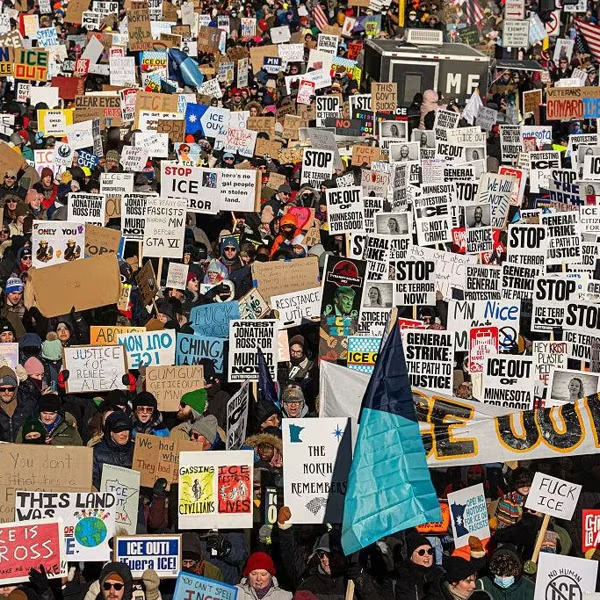
Sen. Lindsey Graham (R-S.C.) speaks to the media on May 12, 2020. (Photo: Michael Brochstein/Echoes Wire/Barcroft Media/Getty Images)
Supreme Court Election Year Vacancy 'Would be Different' This Time From Merrick Garland in 2016, Says Lindsey Graham
"These people don't even have an ounce of shame."
Chair of the Senate Judiciary Committee Sen. Lindsey Graham said in an interview airing Sunday that the public should not expect a vacancy on the Supreme Court to remain open this election year, despite what happened last time.
Graham, a South Carolina Republican, told journalist Greta Van Susteren that 2020 presents a different situation than in 2016 when Merrick Garland's nomination languished ahead of the election when Senate Majority Leader Mitch McConnell (R-Ky.) denied then-President Barack Obama the opportunity to replace Justice Antonin Scalia upon Scalia's death. President Donald Trump appointed Neil Gorsuch to the seat in 2017.
"Well, Merrick Garland was a different situation," Graham said. "You had the president of one party nominating, and you had the Senate in the hands of the other party."
"A situation where you've got them both would be different," the senator added.
During his remarks to Van Susteren's Full Court Press With Greta Van Susteren show for Gray Television, Graham made a highly technical distinction between 2016 and 2020 that seemed to rely mostly on justifying the reversal based on the current circumstances rather than going on the example from just four years ago.
"If you look into the history of the country, there had not been an occasion where somebody was confirmed in a presidential election year after primary started when you had divided government," said Graham.
Senate Republicans have made no secret of the ongoing efforts to transform the federal judiciary. As Common Dreams reported on May 4, McConnell's intention to ram through judicial nominees even in the face of the coronavirus outbreak sparked a call from over 40 groups for the Senate to slow down on the process during the pandemic.
"The Senate Judiciary Committee, and the Senate as a whole, must take the necessary and commonsense action of putting the processing of judicial nominations on hold until the devastating impact of the pandemic has been diminished," the groups demanded in an open letter.
But those appeals have not had much effect on the GOP leadership.
"My motto for the year is leave no vacancy behind," McConnell told radio host Hugh Hewitt in an interview in April. "That hasn't changed."
Graham echoed those comments in his interview with Van Susteren.
"Appointing judges is a high priority for me in 2020," said Graham.
An Urgent Message From Our Co-Founder
Dear Common Dreams reader, The U.S. is on a fast track to authoritarianism like nothing I've ever seen. Meanwhile, corporate news outlets are utterly capitulating to Trump, twisting their coverage to avoid drawing his ire while lining up to stuff cash in his pockets. That's why I believe that Common Dreams is doing the best and most consequential reporting that we've ever done. Our small but mighty team is a progressive reporting powerhouse, covering the news every day that the corporate media never will. Our mission has always been simple: To inform. To inspire. And to ignite change for the common good. Now here's the key piece that I want all our readers to understand: None of this would be possible without your financial support. That's not just some fundraising cliche. It's the absolute and literal truth. We don't accept corporate advertising and never will. We don't have a paywall because we don't think people should be blocked from critical news based on their ability to pay. Everything we do is funded by the donations of readers like you. Will you donate now to help power the nonprofit, independent reporting of Common Dreams? Thank you for being a vital member of our community. Together, we can keep independent journalism alive when it’s needed most. - Craig Brown, Co-founder |
Chair of the Senate Judiciary Committee Sen. Lindsey Graham said in an interview airing Sunday that the public should not expect a vacancy on the Supreme Court to remain open this election year, despite what happened last time.
Graham, a South Carolina Republican, told journalist Greta Van Susteren that 2020 presents a different situation than in 2016 when Merrick Garland's nomination languished ahead of the election when Senate Majority Leader Mitch McConnell (R-Ky.) denied then-President Barack Obama the opportunity to replace Justice Antonin Scalia upon Scalia's death. President Donald Trump appointed Neil Gorsuch to the seat in 2017.
"Well, Merrick Garland was a different situation," Graham said. "You had the president of one party nominating, and you had the Senate in the hands of the other party."
"A situation where you've got them both would be different," the senator added.
During his remarks to Van Susteren's Full Court Press With Greta Van Susteren show for Gray Television, Graham made a highly technical distinction between 2016 and 2020 that seemed to rely mostly on justifying the reversal based on the current circumstances rather than going on the example from just four years ago.
"If you look into the history of the country, there had not been an occasion where somebody was confirmed in a presidential election year after primary started when you had divided government," said Graham.
Senate Republicans have made no secret of the ongoing efforts to transform the federal judiciary. As Common Dreams reported on May 4, McConnell's intention to ram through judicial nominees even in the face of the coronavirus outbreak sparked a call from over 40 groups for the Senate to slow down on the process during the pandemic.
"The Senate Judiciary Committee, and the Senate as a whole, must take the necessary and commonsense action of putting the processing of judicial nominations on hold until the devastating impact of the pandemic has been diminished," the groups demanded in an open letter.
But those appeals have not had much effect on the GOP leadership.
"My motto for the year is leave no vacancy behind," McConnell told radio host Hugh Hewitt in an interview in April. "That hasn't changed."
Graham echoed those comments in his interview with Van Susteren.
"Appointing judges is a high priority for me in 2020," said Graham.
Chair of the Senate Judiciary Committee Sen. Lindsey Graham said in an interview airing Sunday that the public should not expect a vacancy on the Supreme Court to remain open this election year, despite what happened last time.
Graham, a South Carolina Republican, told journalist Greta Van Susteren that 2020 presents a different situation than in 2016 when Merrick Garland's nomination languished ahead of the election when Senate Majority Leader Mitch McConnell (R-Ky.) denied then-President Barack Obama the opportunity to replace Justice Antonin Scalia upon Scalia's death. President Donald Trump appointed Neil Gorsuch to the seat in 2017.
"Well, Merrick Garland was a different situation," Graham said. "You had the president of one party nominating, and you had the Senate in the hands of the other party."
"A situation where you've got them both would be different," the senator added.
During his remarks to Van Susteren's Full Court Press With Greta Van Susteren show for Gray Television, Graham made a highly technical distinction between 2016 and 2020 that seemed to rely mostly on justifying the reversal based on the current circumstances rather than going on the example from just four years ago.
"If you look into the history of the country, there had not been an occasion where somebody was confirmed in a presidential election year after primary started when you had divided government," said Graham.
Senate Republicans have made no secret of the ongoing efforts to transform the federal judiciary. As Common Dreams reported on May 4, McConnell's intention to ram through judicial nominees even in the face of the coronavirus outbreak sparked a call from over 40 groups for the Senate to slow down on the process during the pandemic.
"The Senate Judiciary Committee, and the Senate as a whole, must take the necessary and commonsense action of putting the processing of judicial nominations on hold until the devastating impact of the pandemic has been diminished," the groups demanded in an open letter.
But those appeals have not had much effect on the GOP leadership.
"My motto for the year is leave no vacancy behind," McConnell told radio host Hugh Hewitt in an interview in April. "That hasn't changed."
Graham echoed those comments in his interview with Van Susteren.
"Appointing judges is a high priority for me in 2020," said Graham.

